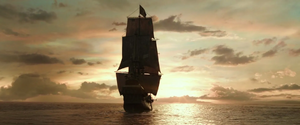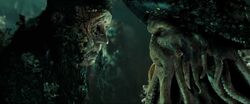
- "Wherever we want to go, we go. That's what a ship is, you know. It's not just a keel and a hull and a deck and sails. That's what a ship needs. But what a ship is...what the Black Pearl really is...is freedom."
- ―Jack Sparrow to Elizabeth Swann
Freedom is the power or right to act, speak, and change as one wants without hindrance or restraint. Freedom is often associated with liberty and autonomy in the sense of "giving oneself one's own laws".
History
- "Letters of Marque. You will offer what amounts to a full pardon. Jack will be free, a privateer in the employ of England."
"Somehow I doubt Jack will consider employment the same as being free."
"Freedom!" - ―Cutler Beckett and William Turner Jr.
During the Age of Piracy, piracy and freedom were often strongly correlated and associated. Whether it was a specific ship or the ability to determine one's own fate, there was something about the pirate's life that gave a sense of true freedom.
The Pirata Codex book had a section that was all about freedom and the need for a pirate to make decisions for himself. After reading that passage young Jack Sparrow decided that clearly gave him justification to leave his family. However, after sneaking away, he realized his freedom came with a heavy price. Without "The-Man-Who-Might-Be-Dad", who was always by his side when he needed him most, Jack had to go trough life alone, and he wasn't sure if he was ready for that kind of freedom.[1] After meeting the barmaid Arabella Smith in Tortuga and learning about the Sword of Cortés, Jack convinced her to join him because the legendary weapon would bring them freedom and power.[2] Around the same time, the notorious pirate Captain Torrents ended up serving against his will aboard the infamous ghost ship, the Flying Dutchman. However, Torrents made a deal with the ship's supernatural captain, Davy Jones, promising to bring him the Sword of Cortés and its scabbard in exchange for his freedom.[3]
During the quest for the Sword of Cortés, the crew of the Barnacle fell victim to the siren song, somewhere in the Caribbean Sea. The haunting melody was used by the merfolk of Isla Sirena in an attempt to kill them all. Jack Sparrow confronted the mermaid leaders of Isla Sirena, Morveren, Aquala, and Aquila, and managed to convince them to release his crew from their spell in exchange for his greatest treasure. Only after he left Stone-Eyed Sam's stone eye as collateral with the promise to come back, Jack realized his greatest treasure was his freedom, and he had foolishly traded it away.[4]
The society of the legendary island of Kerma was almost a copy of ancient Egypt. As such, Kermans practiced slavery for thousands of years. However, after the Princess Amenirdis experienced the horrors of slavery first hand, living imprisoned in Calabar as the property of rich white men, Roger Dalton and Cutler Beckett, she swore she would free all of Kerma's slaves if she ever returns home. With the help of Jack Sparrow, Amenirdis returned to Kerma with her long lost brother Shabako, who was freed from slavery in the Bahamas. Once he was crowned as the new Pharaoh, Shabako's first royal proclamation was that all the slaves on the island would be declared free within one year.[5] Some time later, the EITC Director for West Africa, Cutler Beckett, forced Jack to take almost two hundred slaves aboard his ship, the Wicked Wench, to transport to the island of New Avalon in the Bahamas, for the plantation of Buckett's superior, Lord Reginald Marmaduke Bracegirdle-Penwallow. However, in the middle of the voyage, Jack decided to free the slaves, and sailed the Wench for Kerma, where the young pharaoh gave them asylum. Jack's actions eventually cost him his own freedom, because he was captured by the East India Company.[6]
The Spanish princess Carolina believed the whole point of being a pirate was freedom.[7]
Captain Jack Sparrow famously viewed his precious ship, the Black Pearl, as representing freedom itself, possibly due to using it to free slaves when he was a sailor for the East India Company.[8] Jack would often shout "You will always remember this as the day you almost captured Captain Jack Sparrow!" to his enemies, mocking those who failed to deprive him of his freedom.[9] During the War Against Piracy, which was itself a war for the pirates to preserve their freedom, the reason Jack so strongly desired to stab Jones' heart and take his place as Captain of the Flying Dutchman was to "be free forever" and be "free from death itself".[10][11]
Behind the scenes

- "What we like about pirates is that they represent freedom."
- ―Ted Elliott
Freedom was first mentioned in the Irene Trimble's junior novelization of the 2003 film Pirates of the Caribbean: The Curse of the Black Pearl.
In Ted Elliott and Terry Rossio's screenplay for the 2006 film Pirates of the Caribbean: Dead Man's Chest, Will Turner played Liar's Dice with Davy Jones two times, with Will beating Jones the first time and winning his father Bootstrap Bill's freedom.[12] The scene never made it to the final cut of the film but was retained in the film's junior novelization as well as the deleted scene "Married To The Ship" featured in Blu-ray releases beginning in 2011.
In the 2017 film Pirates of the Caribbean: Dead Men Tell No Tales, when Shansa the sea witch is brought to Carina Smyth's prison cell, Lieutenant John Scarfield orders her to decipher the carvings on the wall. Shansa then proclaims that his destiny is in the stars. In the French adaptation of Elizabeth Rudnick's novelization, Shansa demands freedom in exchange for her services.[13]
Appearances
- Jack Sparrow: The Coming Storm
- Jack Sparrow: The Siren Song
- Jack Sparrow: The Pirate Chase
- Jack Sparrow: The Sword of Cortés
- Jack Sparrow: City of Gold
- Jack Sparrow: Dance of the Hours
- Jack Sparrow: Sins of the Father
- Jack Sparrow: The Tale of Billy Turner and Other Stories
- The Price of Freedom
- Legends of the Brethren Court: The Caribbean
- Legends of the Brethren Court: Rising in the East
- Legends of the Brethren Court: The Turning Tide
- Legends of the Brethren Court: Wild Waters
- Legends of the Brethren Court: Day of the Shadow
- Pirates of the Caribbean: The Curse of the Black Pearl
- Revenge of the Pirates!
- A Revolting Development!
- The Star of the Seas
- Pirates of the Caribbean: Dead Man's Chest
- Pirates of the Caribbean: At World's End
- Pirates of the Caribbean: On Stranger Tides
- Pirates of the Caribbean: Dead Men Tell No Tales
External links
Notes and references
- ↑ Jack Sparrow: Sins of the Father, pp. 3-5
- ↑ Jack Sparrow: The Coming Storm, p. 29
- ↑ Jack Sparrow: The Coming Storm, pp. 126-128
- ↑ Jack Sparrow: The Siren Song, pp. 110-115
- ↑ The Price of Freedom, Chapter Fifteen: Kerma
- ↑ The Price of Freedom, Chapter Eighteen: Exodus
- ↑ Legends of the Brethren Court: The Turning Tide, pp. 73-74
- ↑ Legends of the Brethren Court: The Caribbean, Chapter Eight
- ↑ Legends of the Brethren Court: Day of the Shadow, Epilogue
- ↑ Pirates of the Caribbean: The Curse of the Black Pearl
- ↑ Pirates of the Caribbean: At World's End
- ↑ Wordplayer.com: PIRATES OF THE CARIBBEAN: DEAD MAN'S CHEST by Ted Elliott & Terry Rossio
- ↑ Pirates des Caraïbes : La Vengeance de Salazar - Le roman du film, pp. 98-99